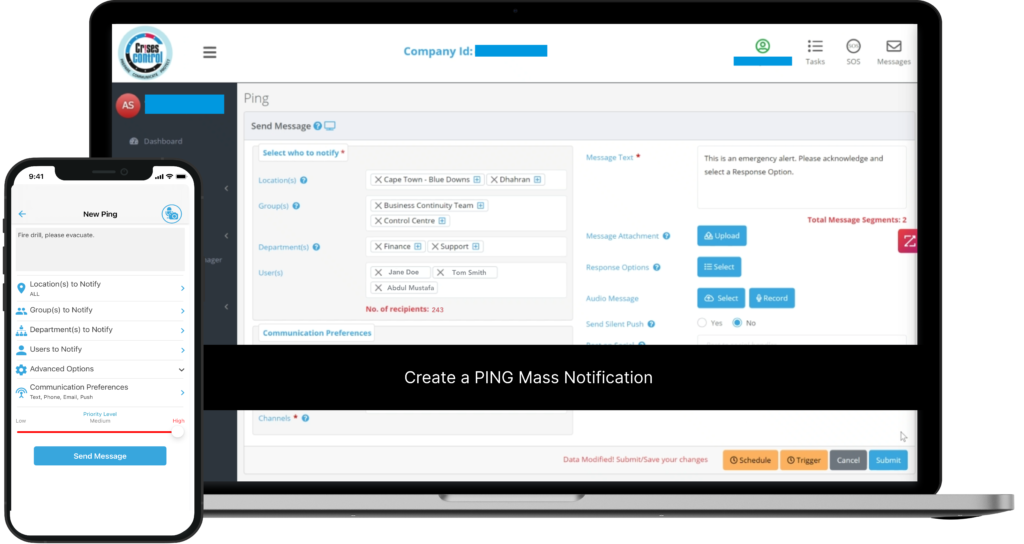Written by Anneri Fourie | Marketing Executive
Having an efficient emergency communication system is crucial for maintaining safety, managing crises, and ensuring business continuity. Whether you’re managing a healthcare facility, an educational institution, a manufacturing plant, or a hospitality business, tailored emergency communication software can make a significant difference.
This blog explores how different industries can benefit from specialised solutions and how Crises Control’s software can address their unique needs.
Understanding the Need for Industry-Specific Emergency Communication Software
The Importance of Emergency Communication Software
Emergency communication software is designed to facilitate rapid, reliable, and effective communication during crises. It enables organisations to alert and coordinate with employees, stakeholders, and emergency services in real-time. In an era where every second counts, having a robust system in place can prevent potential disasters, ensure swift responses, and maintain operational integrity.
Why Industry-Specific Solutions Matter
Different industries face unique challenges and requirements when it comes to crisis management. A one-size-fits-all approach often falls short of addressing these specific needs. Tailoring emergency communication solutions to industry-specific scenarios ensures that the software aligns with the operational realities and regulatory requirements of each sector. This customisation enhances the effectiveness of the system and improves overall response times.
Interested in our Cloud-Based Emergency Communication Software?
Efficiently alert everyone in seconds at scale with our Mass Notification System – PING, get the message out fast and ensure rapid response and recovery.

How Crises Control Enhances Emergency Communication Across Industries
Healthcare
Healthcare facilities, including hospitals and clinics, operate under high-stress conditions where every second matters. The need for rapid response to medical emergencies, coordinated care between different departments, and secure communication of sensitive patient information are paramount.
Crises Control offers several features specifically designed to address these challenges:
- Incident Management: Streamline the coordination of medical staff and resources during emergencies, ensuring quick and efficient responses.
- Ping Mass Notification: Instantly alert healthcare professionals about critical updates or emergency situations, improving response times and patient care.
- Secure Communication Channels: Safeguard sensitive patient data and communications with encrypted messaging and secure access controls.
By integrating Crises Control’s solutions, healthcare facilities can enhance their emergency response protocols, ultimately ensuring better patient outcomes and operational efficiency.
Education
Educational institutions, such as schools and universities, need to manage the safety of students and staff across large campuses. Emergencies can range from natural disasters to security threats, requiring a coordinated and timely response.
Crises Control addresses these needs with:
- SOS Panic Button: Allow students and staff to quickly alert authorities and emergency responders during critical situations.
- Reporting and Audit: Track and review emergency responses to improve safety protocols and preparedness.
- Integration with School Management Systems: Seamlessly connect with existing administrative systems for efficient communication and coordination.
These tailored features help educational institutions maintain a secure environment and manage crises effectively, ensuring the safety of all individuals on campus.
Manufacturing
Manufacturing facilities often involve complex operations with numerous hazards. Managing safety across large plants, coordinating between different shifts, and responding to equipment failures or accidents require specialised communication solutions.
Crises Control provides tools to meet these needs:
- Task Manager: Assign and track tasks during emergencies to ensure all response actions are executed effectively.
- Incident Plan Builder: Develop detailed emergency response plans tailored to the specific needs of manufacturing environments.
- Mass Notifications: Alert all on-site and off-site staff about critical incidents, ensuring that everyone is informed and can act accordingly.
With Crises Control, manufacturing facilities can enhance their safety protocols, minimise disruptions, and maintain operational continuity even during emergencies.
Retail
Retail businesses, from large department stores to shopping malls, need to manage safety across multiple locations and shifts. Effective communication during emergencies can be challenging, especially when dealing with large volumes of customers and staff.
Crises Control offers solutions for the retail sector, including:
- Easy Integration: Connect with existing retail management systems to streamline communication and alerting processes.
- Ping Mass Notification: Rapidly notify staff and customers about emergencies, ensuring a coordinated response and minimising confusion.
- Reporting and Audit: Monitor and review emergency responses to enhance safety measures and operational efficiency.
These features help retail businesses manage emergencies more effectively, ensuring that all locations are prepared and responsive.
Hospitality
In the hospitality industry, guest safety and seamless operations are top priorities. Hotels and resorts must manage emergency situations efficiently while maintaining a positive guest experience.
Crises Control enhances hospitality operations with:
- Incident Management: Coordinate emergency responses across different hotel departments and locations.
- SOS Panic Button: Enable staff to quickly alert security and emergency services if needed, improving guest safety.
- Integration with Property Management Systems: Ensure smooth communication and coordination during emergencies by connecting with existing systems.
Crises Control’s solutions ensure that hospitality businesses can manage emergencies effectively while maintaining high standards of guest care.
Conclusion
Emergency communication software is a vital component of effective crisis management and business continuity across various industries. By tailoring solutions to meet the unique needs of each sector, organisations can enhance their response capabilities and ensure safety and operational efficiency.
Crises Control offers specialised emergency communication software designed to address the specific challenges faced by healthcare, education, manufacturing, retail, and hospitality industries. With features like Incident Management, Ping Mass Notification, and SOS Panic Button, Crises Control ensures that your organisation is prepared to handle emergencies swiftly and effectively.
Ready to see how Crises Control can transform your emergency communication strategy? Contact us today to schedule a free demo and discover how our tailored solutions can benefit your organisation.
Request a FREE Demo

